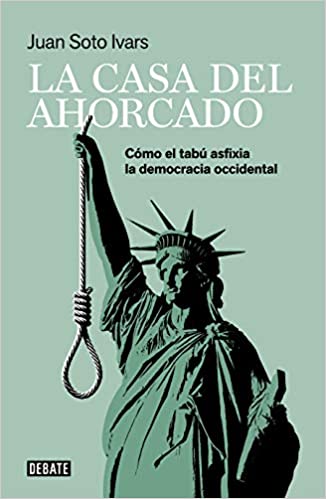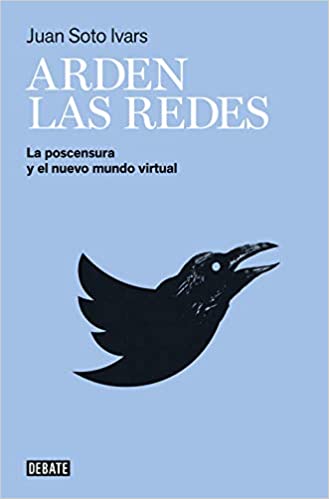In the case of John Soto Ivars You never know if it is about the writer who came to journalism or if, on the contrary, he took the reverse path to get to writing from journalism. I say this because in other cases it is evident that popular journalists approach literature as a collateral activity, due to the fact that both specialties narrate certain or invented events.
Nothing to do with launching free criticism of writers from television with their already weighty bibliography such as Carme Chaparro o Risto Mejide. But it is true that in every leap from the mass media to literature arouses reluctance that can only be appeased by reading in turn.
Sticking to Juan Soto Ivars there is no doubt about it because his performances advance in parallel. The seasoned writer in the press and the journalist valued as a man of letters from his journalistic task. A spiral finally fed by good works on either side of the threshold between reality and fiction.
Top 3 recommended books Juan Soto Ivars
Crimes of the future
Rarely has the future been written about as an idyllic future in which the return to paradise or the promised land is anticipated with a scent of the triumphant final parade of our civilization. Quite the opposite, the condemnation to wander through this valley of tears has always borne fruit in fatalistic dystopias or uchronias in which hope in our species is, in reductionist mathematical terms, equal to 0. This new one also moves along that line. novel by the young, although already established writer, Juan Soto Ivars.
Crimes of the Future, with that reminiscence in the title to Philip K. Dick, tells us about the world on the verge of its apocalyptic implosion. One of the most interesting aspects is the recognizable association with the current evolution of the globalized world (especially in terms of markets) and hyperconnected. Delving about the future from the base of our present facilitates that intention to delve into the great problems and challenges that are approaching us.
But any story at a later time can always provide new ideas halfway between science fiction, philosophy, politics and the social. At least that interrelated aspect is what I usually like the most about this type of plot. In the future that is told to us in this story, the liberalism born in the 18th century has already found its fullness. Only the Entity "governs" and sets the guidelines for a world handed over to multinationals protected in all their actions under the umbrella of that Entity.
The outlook does not look very rosy. A new world full of slogans that make up the post-truth between economic, social, political and even moral misery. Only that post-truth no longer has a place in light of the ruinous existence. Hope, to the extent that it can be recovered, remains low in some characters in the novel. Like the three women who capitalize on the necessary rebellious role from the ashes of humanity defeated by its own monster.
The house of the hanged man
The offended are now a battalion and act as a sinister ostracon where they intend to mark anyone who exceeds their red lines. Morality today is a strange heritage crumbled into a number of consciences incapable, however, of the final syntheses that could provide efficient service for society.
The common projects that Western democratic societies have sustained seem broken. Not even a global pandemic can make us understand that great challenges require collective responses. Subjected to the rules of identitarianism, extreme polarization has given rise to tribal narcissism and self-referential self-absorption. Collectives eroticized by their own identity and hostile to the rest, professional victimizers and exclusive nationalists dominate a panorama where it seems justifiable to eliminate the rights of people in pursuit of a greater cause.
The house of the hanged man is a devastating and controversial essay that looks at the effects of the culture of sentimentality on freedom of expression and analyzes some of the most alarming manifestations of our retreat towards the tribe. With an anthropological perspective, but without academic intention, Soto Ivars offers us a journey through various contemporary cases of a return to taboo, sacred horror, the scapegoat, heresy and ritual punishment, and proposes the restoration of the concept of citizenship as the only way out to the civil war of identities.
The networks burn
Social networks are today the penalty of exhibition in the pillory. Nobody is saved from the trending topics, those top in which it is better not to appear so as not to be eaten by the mob when not dead ...
The climate of constant and massive irritation on social networks has generated a new type of censorship that applies its prohibitions in an organic, unpredictable and chaotic way. Users participate in all the controversies driven by the thirst for recognition, dizzy by overinformation and confused by the relativism of the truth, while certain voices disappear for fear of humiliation.
Social networks have led us to a new world in which we live surrounded by the opinions of others. What seemed like the total conquest of freedom of expression has made a part of the citizenry stir, uncomfortable. Pressure groups organized in the networks - Catholics, feminists, left and right activists - have begun to pursue what they consider intolerable "excesses" through digital lynching, boycott petitions and signature collections. Justice has been democratized and the silent majority has found a ruthless voice that turns disgrace into a new form of social control, where freedom of expression does not need laws, officials or a repressive state.
Through real cases of lynching such as those of Justine Sacco, Guillermo Zapata or Jorge Cremades, this book, both honest and disturbing, dissects the censorious climate of our time, showing us the reality in which we live immersed and the terrifying role that we all play.



